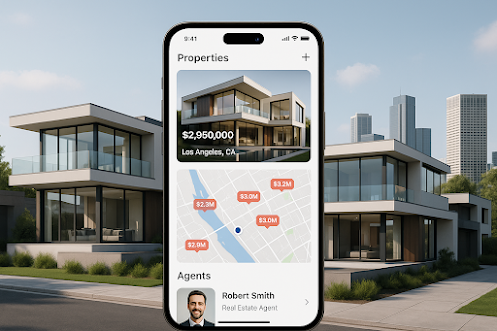Real Estate App Startup Guide: Build & Launch a Digital Property Business in 2025
If you’re ready to modernize the property business, launching a real estate app might be the smartest move you can make in 2025. Whether you’re a realtor, investor, or a tech entrepreneur, the demand for seamless digital property solutions is growing fast.
This guide will take you step by step through launching a real estate app—from market research and planning to app features, monetization, and launch.
Why Build a Real Estate App?
Traditional property dealings are outdated. Buyers, renters, and investors want instant access to listings, virtual tours, and verified agents—all in one place. That’s where your app comes in.
Here’s why it’s a great business opportunity:
-
Over 70% of home buyers start their search online, many via mobile.
-
Real estate apps like Zillow and Redfin have proven market demand.
-
There’s still room for niche or regional players to dominate specific markets.
Real Estate App Models You Can Choose
1. Property Listings App
Like Zillow or Realtor.com—shows properties for sale or rent with filters, pricing, photos, and contact options.
2. Real Estate Marketplace
Allow sellers, landlords, and agents to list their own properties. You earn commissions or listing fees.
3. Real Estate CRM App
Build an app for real estate agents to manage leads, appointments, and follow-ups.
4. Rental Management App
Help landlords and tenants manage rent payments, maintenance requests, and agreements digitally.
Key Features Every Real Estate App Needs
Your app should be user-friendly, feature-rich, and reliable. Essential features include:
-
Advanced Search Filters (location, price, size, etc.)
-
Photo Galleries & Virtual Tours
-
Map Integration with Nearby Facilities
-
Push Notifications for New Listings
-
Agent or Seller Contact Options
-
Favorites/Wishlist Function
-
In-App Chat Support
-
Document Upload & E-Signatures
Want to make your app stand out? Add AI-based property suggestions or mortgage calculators.
Steps to Build Your Real Estate App
1. Do Your Market Research
Study your local or target market. Look for gaps in current apps—maybe there’s a demand for a rental-focused app in your region or an app that highlights only verified agents.
2. Choose Your Tech Stack or Platform
Instead of starting from scratch, you can go with a white-label real estate app solution like Miracuves. Their platform offers:
-
Customizable front end
-
Admin dashboard for listing and user management
-
Agent/vendor panel
-
Customer panel with search and booking
-
Payment and subscription integration
This reduces development time and lets you focus on business growth.
3. Monetization Options for Your App
How will you earn money?
-
Listing Fees – Charge agents or owners to list properties.
-
Subscription Models – Offer pro features to paying users or agents.
-
Commission on Deals – Earn a cut from successful transactions.
-
Featured Listings – Let sellers pay to boost visibility.
-
Ad Placements – Monetize with in-app ads or sponsored content.
4. Legal and Compliance Essentials
Don’t overlook this:
-
Ensure GDPR or region-specific data privacy compliance.
-
Use verified agents and property documentation.
-
Offer clear disclaimers and terms for listings.
This builds user trust and prevents legal issues down the road.
5. UI/UX That Feels Trustworthy
In real estate, trust is everything. Your app’s design should convey transparency and professionalism:
-
Clean layout with minimal clutter
-
Verified badges for agents
-
Highlighting reviews and property details clearly
-
Smooth navigation and fast loading times
Go-to-Market Strategy for Your Real Estate App
1. Local Agent Partnerships
Onboard real estate agents and property managers before launch to preload your platform with listings.
2. Online Marketing
-
SEO-optimized content like “Buy 2BHK in [City]”
-
Google & Facebook ads
-
Instagram and YouTube walkthroughs of properties
3. Referral and Loyalty Programs
Reward users for sharing the app or completing their first listing or booking.
Challenges You Might Face (And How to Overcome Them)
| Challenge | Solution |
|---|---|
| Low initial listings | Offer free or discounted listings to early adopters |
| Trust issues | Add verified profiles, reviews, and secure payment options |
| App abandonment | Use push notifications and email automation |
| Legal issues | Consult real estate lawyers and stay compliant with housing laws |
Success Story: How Miracuves Helps Real Estate Startups
Startups using Miracuves Real Estate Solutions have seen rapid deployment, high scalability, and easy agent onboarding. From city-specific apps to niche commercial property platforms, their white-label solution makes real estate app businesses profitable and manageable.
Also check out their on-demand delivery business guide if you're looking to diversify.
Conclusion
Starting a real estate app business is not just about tech—it’s about solving real problems for people trying to find homes, sell properties, or manage rentals. With the right tools, platform, and marketing plan, your app could be the go-to solution for thousands in your region.
Real estate is evolving—your app could lead that change.
FAQs
1. Can I start a real estate app without technical knowledge?
Yes! With platforms like Miracuves, you can launch your app with no coding.
2. What’s the cost of building a real estate app?
Custom apps can be expensive, but white-label options significantly lower costs.
3. Can I include rental and sale listings in the same app?
Absolutely. Most successful apps offer both to cater to a broader market.
4. How do I get agents to list on my app?
Offer incentives, marketing support, and a user-friendly dashboard to onboard them.
5. Is this model scalable to other cities or countries?
Yes! Once your MVP works in one region, you can expand gradually with the same infrastructure.




Comments
Post a Comment